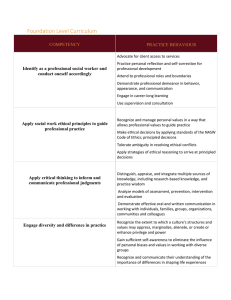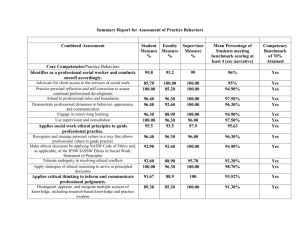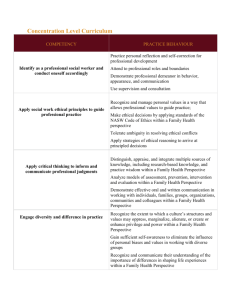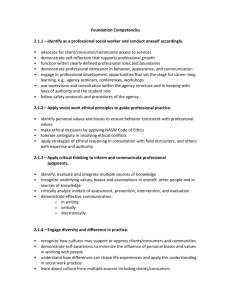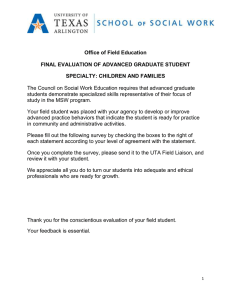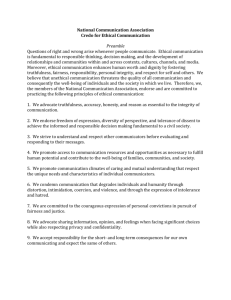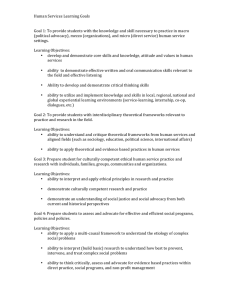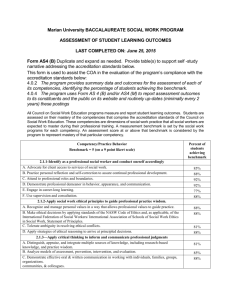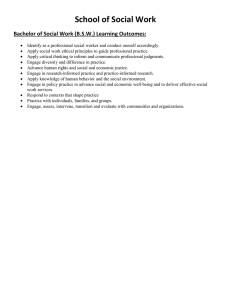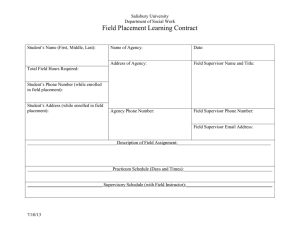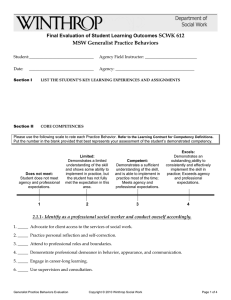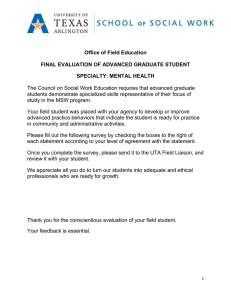The Mission of the Social Work Program
advertisement
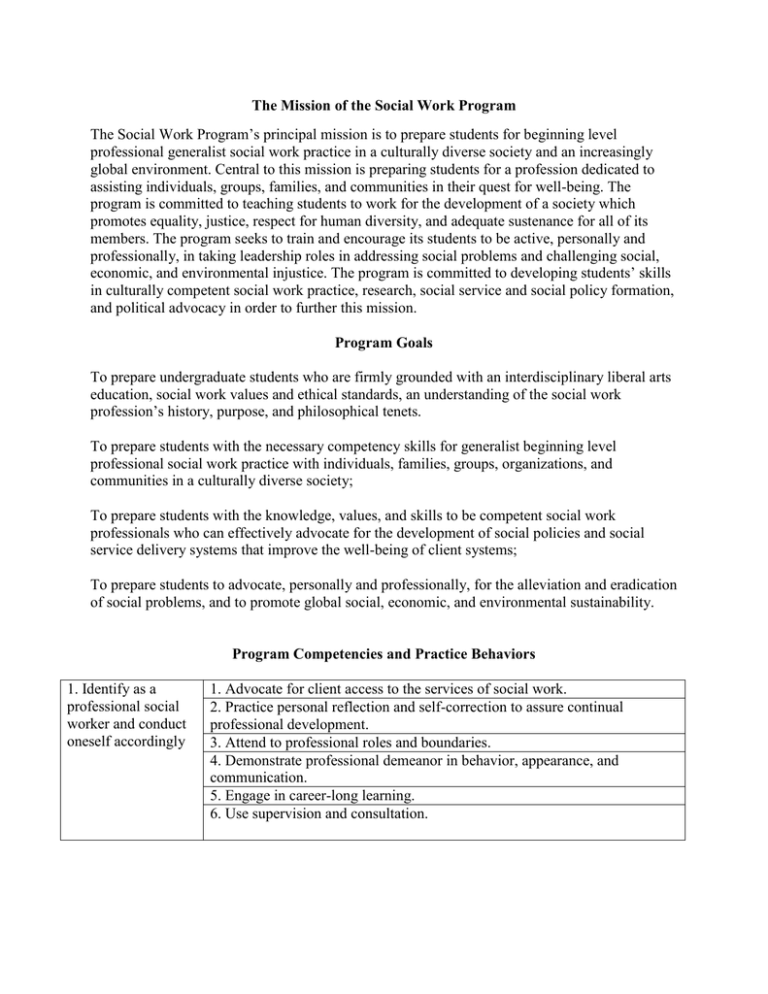
The Mission of the Social Work Program The Social Work Program’s principal mission is to prepare students for beginning level professional generalist social work practice in a culturally diverse society and an increasingly global environment. Central to this mission is preparing students for a profession dedicated to assisting individuals, groups, families, and communities in their quest for well-being. The program is committed to teaching students to work for the development of a society which promotes equality, justice, respect for human diversity, and adequate sustenance for all of its members. The program seeks to train and encourage its students to be active, personally and professionally, in taking leadership roles in addressing social problems and challenging social, economic, and environmental injustice. The program is committed to developing students’ skills in culturally competent social work practice, research, social service and social policy formation, and political advocacy in order to further this mission. Program Goals To prepare undergraduate students who are firmly grounded with an interdisciplinary liberal arts education, social work values and ethical standards, an understanding of the social work profession’s history, purpose, and philosophical tenets. To prepare students with the necessary competency skills for generalist beginning level professional social work practice with individuals, families, groups, organizations, and communities in a culturally diverse society; To prepare students with the knowledge, values, and skills to be competent social work professionals who can effectively advocate for the development of social policies and social service delivery systems that improve the well-being of client systems; To prepare students to advocate, personally and professionally, for the alleviation and eradication of social problems, and to promote global social, economic, and environmental sustainability. Program Competencies and Practice Behaviors 1. Identify as a professional social worker and conduct oneself accordingly 1. Advocate for client access to the services of social work. 2. Practice personal reflection and self-correction to assure continual professional development. 3. Attend to professional roles and boundaries. 4. Demonstrate professional demeanor in behavior, appearance, and communication. 5. Engage in career-long learning. 6. Use supervision and consultation. 2. Apply social work ethical principles to guide professional practice 3. Apply critical thinking to inform and communicate professional judgments 4. Engage diversity and difference in practice 7. Recognize and manage personal values in a way that allows professional values to guide practice. 8. Make ethical decisions by applying standards of NASW Code of Ethics and, as applicable, IFSW/IASSW Ethics Principles. 9. Tolerate ambiguity in resolving ethical conflicts. 10. Apply strategies of ethical reasoning to arrive at principled decisions. 11. Distinguish, appraise, and integrate multiple sources of knowledge, including research-based knowledge, and practice wisdom. 12. Analyze models of assessment, prevention, intervention, and evaluation. 13. Demonstrate effective oral and written communication in working with individuals, families, groups, organizations, communities, and colleagues. 14. Recognize the extent to which a culture’s structures and values may oppress, marginalize, alienate, or create or enhance privilege and power. 15. Gain sufficient self-awareness to eliminate the influence of personal biases and values in working with diverse groups. 16. Recognize and communicate their understanding of the importance of difference in shaping life experiences. 17. View themselves as learners and engage those with whom they work as informants. 5 Advance human rights and social, economic, and environmental justice 6. Engage in research-informed practice and practice-informed research 7. Apply knowledge of human behavior and the social environment 18. Understand the forms and mechanisms of oppression and discrimination. 19. Advocate for human rights and social and economic justice. 20. Engage in practices that advance social and economic justice. 8. Engage in policy practice to advance social and economic well-being and to deliver effective social work services 25. Analyze, formulate, and advocate for policies that advance social wellbeing. 21. Use practice experiences to inform scientific inquiry. 22. Use research evidence to inform practice. 23. Utilize conceptual frameworks to guide the process of assessment, intervention, and evaluation. 24. Critique and apply knowledge to understand person and environment. 26. Collaborate with colleagues and clients for effective policy action. 9. Respond to contexts that shape practice 27. Continuously discover, appraise, and attend to changing locales, populations, scientific and technological developments, and emerging societal trends to provide relevant services. 28. Provide leadership in promoting sustainable changes in service delivery and practice to improve the quality of social services. 10 Engage, assess, intervene, and evaluate with individuals, families, groups, organizations and communities 29. Substantively and affectively prepare for action with individuals, families, groups, organizations, and communities. 30. Use empathy and other interpersonal skills. 31. Develop a mutually agreed-on focus of work and desired outcomes . 32. Collect, organize and interpret client data. 33. Assess client strengths and limitations. 34. Develop mutually agreed-on intervention goals and objectives. 35. Select appropriate intervention strategies. 36. Initiate actions to achieve organizational goals. 37. Implement prevention interventions that enhance client capacities. 38. Help clients resolve problems. 39. Negotiate, mediate, and advocate for clients. 40. Facilitate transitions and endings. 41. Critically analyze, monitor, and evaluate interventions.
